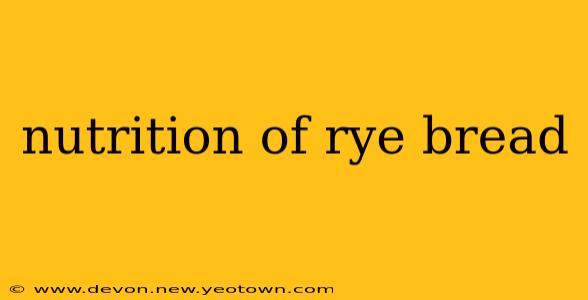Rye bread. The very name conjures images of rustic bakeries, hearty stews, and perhaps even a bit of a medicinal tang. But beyond its comforting aroma and satisfying texture lies a nutritional powerhouse often overlooked in today's fast-paced world. This isn't just any bread; rye boasts a unique nutritional profile that sets it apart from its wheat-based counterparts. Let's delve into the fascinating world of rye bread and uncover its hidden health benefits.
My grandmother, a Polish immigrant, always swore by rye bread. She'd slice it thick, spread it with farmer's cheese, and declare, "This is the food of strong people!" As a child, I didn't fully understand, but years later, studying nutrition, I finally grasped the wisdom in her words.
What Makes Rye Bread so Nutritious?
Rye bread's nutritional superiority stems primarily from its unique grain. Unlike wheat, rye contains a higher proportion of insoluble fiber, a type of fiber that doesn't dissolve in water. This is crucial for digestive health, promoting regularity and preventing constipation. It also helps regulate blood sugar levels, making rye bread a particularly good choice for individuals managing diabetes or those looking to maintain stable energy levels throughout the day.
Beyond fiber, rye is also a good source of several essential nutrients, including:
- Manganese: Important for bone health, metabolism, and wound healing.
- Iron: Crucial for oxygen transport throughout the body.
- Magnesium: Plays a role in muscle and nerve function, blood sugar control, and blood pressure regulation.
- Selenium: An antioxidant that protects cells from damage.
It's important to note that the nutritional content can vary depending on the type of rye bread. Whole grain rye bread will generally be more nutritious than breads made with refined rye flour.
Is Rye Bread Gluten-Free?
No, rye bread is not gluten-free. Rye contains a protein called gluten, which can be problematic for individuals with celiac disease or non-celiac gluten sensitivity. While rye gluten has a slightly different structure than wheat gluten, it can still trigger adverse reactions in sensitive individuals. If you have gluten intolerance, be sure to look for certified gluten-free bread options.
How Does Rye Bread Compare to Other Breads?
Compared to white bread, rye bread is significantly higher in fiber and several essential nutrients. White bread, often made from refined flour, is largely stripped of its nutritional value during processing. While whole wheat bread offers some nutritional benefits, rye bread often surpasses it in fiber content and certain minerals.
What are the Health Benefits of Eating Rye Bread?
The high fiber content in rye bread contributes to a multitude of health benefits:
- Improved Digestive Health: The insoluble fiber promotes regular bowel movements and prevents constipation.
- Better Blood Sugar Control: Rye bread's fiber helps slow down the absorption of sugar into the bloodstream, leading to more stable blood sugar levels.
- Lower Risk of Heart Disease: Studies suggest that a diet rich in whole grains, like rye, can help lower cholesterol levels and reduce the risk of heart disease.
- Weight Management: The high fiber content contributes to feelings of fullness, potentially aiding in weight management.
Is Rye Bread Good for Weight Loss?
Rye bread can be a part of a healthy weight loss diet. Its high fiber content promotes satiety, meaning you feel fuller for longer, potentially reducing overall calorie intake. However, portion control remains crucial for weight management, regardless of the type of bread consumed.
What are the Potential Downsides of Eating Rye Bread?
While generally healthy, rye bread can have some drawbacks:
- Gluten Content: As mentioned, it's not suitable for those with gluten intolerance.
- Phytic Acid: Rye, like other grains, contains phytic acid, which can interfere with the absorption of certain minerals. However, soaking or sprouting rye can reduce phytic acid levels.
- Acidity: Some individuals find the slightly sour taste and acidity of rye bread unappealing.
Conclusion: A Hearty and Healthy Choice
Rye bread, with its rich history and impressive nutritional profile, deserves a prominent place in a healthy diet. From its high fiber content to its abundance of essential minerals, rye offers a compelling alternative to other breads. While not a magic bullet, incorporating rye bread into a balanced diet can contribute to improved digestive health, better blood sugar control, and a reduced risk of chronic diseases. So, next time you're at the bakery, remember my grandmother's wisdom, and reach for that hearty loaf of rye. Your body will thank you for it.

